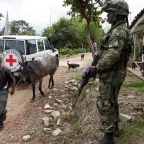Weapons and disarmament
International humanitarian law governs the choice of the means and methods of warfare and prohibits or restricts the use of certain weapons. The ICRC plays a leading role in the promotion and …
International humanitarian law governs the choice of the means and methods of warfare and prohibits or restricts the use of certain weapons. The ICRC plays a leading role in the promotion and …

International humanitarian law (IHL), or jus in bello , is the law that governs the way in which warfare is conducted. Explaining jus ad bellum and jus in bello International humanitarian law (IHL), …

Cluster munitions kill and injure large numbers of civilians and cause long-lasting socio-economic problems. The 2008 Convention on Cluster Munitions prohibits the use, production, stockpiling and …

States often face situations in which their officials must use force to maintain or restore public security and law and order in armed conflicts or other situations of violence. Such use of force is …

Communication is crucial to promote and raise awareness of Restoring Family Links services which are provided by the Family Links Network. Under the joint lead of the Canadian Red Cross and the …
Try one of the following resources:
Created in 1863, the ICRC library, alongside the ICRC archives, provides an indispensable documentary reference on the organization itself and international humanitarian law.
International humanitarian law is based on a number of treaties, in particular the Geneva Conventions of 1949 and their Additional Protocols, and a series of other instruments.
Customary international humanitarian law consists of rules that come from "a general practice accepted as law" and that exist independent of treaty law.